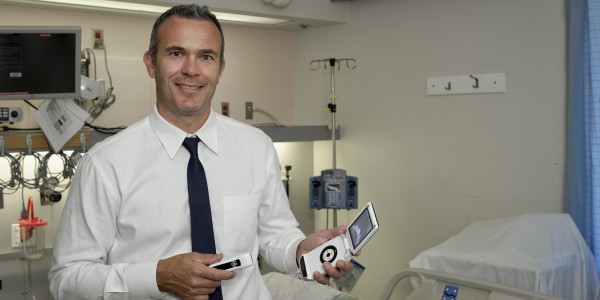VCH Innovation Fund brings new technology to the ED
While handheld ultrasounds aren’t new to healthcare, thanks to funding from VCH’s Innovation Fund, the technology is now being applied in an innovative way at St. Paul’s Hospital.
In 2012, Dr. John Boyd of the Institute for Heart and Lung Health studied the effectiveness of using handheld ultrasounds to diagnose patients with shock before they’re admitted to the ICU.
“On average, correct diagnosis of shock can take up to 36 hours because we rely on echocardiograms, so during that time physicians need to do some educated guesswork to improve the patient’s condition,” Dr. Boyd explains. “That means either administering adrenalin or saltwater to improve heart function of hydration levels.”
However, Dr. Boyd wanted to eliminate the guesswork and determine whether patients could receive a diagnosis as soon as they enter the Emergency Department. His two year study on “hemodynamic assessment service”—which was recently published in the Journal of Critical Care—found that using a hand-held ultrasound not only provided a faster, more accurate diagnosis, but patient survival rates dramatically increased as well.
In Dr. Boyd’s study, 25 per cent of patients were diagnosed with sudden heart failure that otherwise wouldn’t have been discovered, meaning the hand-held ultrasound likely prevented their death. In addition, two-thirds of patients ended up receiving less toxic amounts of fluid and instead were provided with drugs for heart function.
“This technology has dramatically changed medicine,” Dr. Boyd says. “More than 600 people a year come to St. Paul’s in cardiac or respiratory distress, and because of this device, patients will be able to have their condition assessed instantly. We’re really pioneering this technology.”
St. Paul’s was the first hospital in Canada to receive the hand-held ultrasound devices for hemodynamic assessment thanks to the VCH Innovation Fund, and the hospital has the only dedicated service of doctors trained in this particular technique who apply it to patients on a routine basis.
The VCH Innovation Fund supports the development and evaluation of medical technologies so that innovative models of care delivery can be provided at VCH and PHC with an emphasis on effectiveness and efficiency of medical treatments. Since the Fund’s inception in 2011, $700,000 has been provided to recipients for projects. Although funds are no longer being distributed, questions about the Innovation Fund can be directed to Janet Joy.

